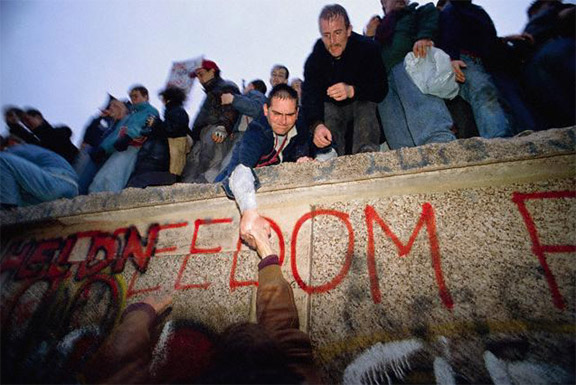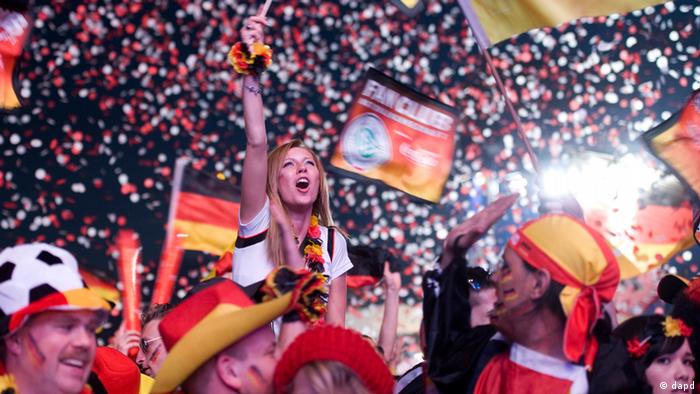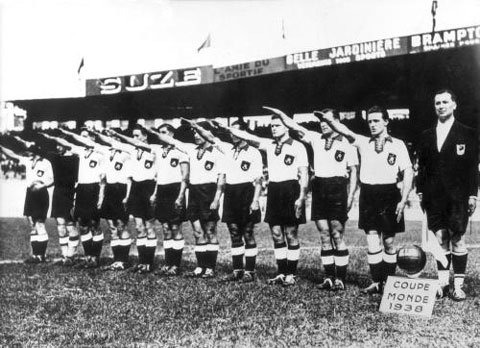The 20th century was a wicked roller coaster ride for Germany.
Two World Wars, each spawned by high levels of nationalism, both resulted in German defeat. In the course of less than fifty years, Germany’s territory, economy, and politics were reduced to rubble, rebuilt, and then subsequently destroyed multiple times. Post World War II, the Allied Powers split Germany into two countries to separate East from West during the Cold War, with the very visible divide in the form of the Berlin Wall. Only with the fall of the Berlin Wall in 1989 did East and West Germany begin the process of reunification. So, where has that left German citizens?

http://therecoveringpolitician.com/wp-content/uploads/2013/03/
berlin20wall20freedom.jpg
Since the end of World War II, Germans have been wary of displaying national pride, which has been suggested by scholars to be a result of war shame and guilt [1]. Even today, nearly seventy years since the end of WWII and over twenty years since the reunification, Germans show relatively low national pride compared to other nations with similar economic and political stability [2]. However, when it comes to football, the display of national pride is a completely different story.
Much to everyone’s surprise, when Germany hosted the 2006 World Cup, German flags flew everywhere during the World Cup. It even came to a surprise for Germans at the time, as the display of the flag became the No. 2 topic of conversation, right behind coverage of the actual World Cup games themselves [3]. Prior to 2006, fans who waved or wore flags in public were less commonplace [4]. In the 2010 World Cup, Germans who crowded into the stadium that held the semifinal between Germany and Spain covered themselves in the nation’s colors — black, gold, and red — and pridefully sang the Deutschland national anthem [5].

http://www.dw.de/image/0,,16032809_303,00.jpg
However, this rise in patriotism due to football has not been met without opposition. Back in Germany during the 2010 World Cup, shopkeeper Ibrahim Bassal, who is a German immigrant himself, hung up a giant German flag outside his shop that had been stolen twice — likely by members of the radical left-wing — and someone even tried to light the flag on fire [6]. Since WWII, Germans have been particularly sensitive to the topic of displaying national pride, as it typically triggers thoughts of war, blind-allegiance, and shame.
Opponents of the increase in nationalism also cite a rise in xenophobia and racism as a main issue. After Germany defeated Denmark in a game during the 2012 UEFA European Championship, anonymous users on Twitter made racist comments about German player Mesut Özil, who is third generation Turkish-German, in hopes of sparking a hate campaign [7]. Since German Turks form the largest minority in Germany [8], it makes sense that these racist comments would be particularly alarming.

http://www.cahiersdufootball.net/images-article/images2/2011_06/
sindelar4_1_allemagne38.jpg
Even though many view sport as an equalizer without any place in politics, it is difficult to deny that football has a history of being manipulated as a form propaganda. Could the football-induced nationalism directly lead to increased xenophobia or violence targeting minorities? Or is that stretching it a bit far? Many Germans and critics will continue to be cautious as traumatizing flashbacks of Nazi Germany haunt their psyche.
Contrastingly, is it so terrible to have the ability to publicly show pride in one’s own nation without being scorned? Germany will continue to emerge from its difficult past, and these are just some of the issues that Germans along with the rest of the world will have to deal with eventually. This is a particularly fascinating case study, and as the 2014 World Cup rolls around, it will be interesting to see the pro- and anti-nationalism dynamics play out once again.
[1] Smith, Tom W., and Lars Jarkko. “National Pride in Cross-National Perspective.” National Opinion Research Center/University of Chicago. N.p.: n.p.,n.d. 1-72. International Social Survey Programme. Web. 6 Dec. 2013.
[2] Smith, Tom W., and Seokho Kim. “National Pride in Cross-national and Temporal Perspective.” International Journal of Public Opinion Research 18 (2006): 127-36. Print.
[3] Bernstein, Richard. “In World Cup Surprise, Flags Fly With German Pride.” The New York Times. N.p., 18 June 2006. Web. 6 Dec. 2013.
[4] Stupp, Catherine. “Proud to be German? Football and the fear of nationalism.” Open Democracy. N.p., 30 July 2013. Web. 6 Dec. 2013.
[5] Farrell, Robert R., and Samuel C. Baxter. “Germany’s Renewed Nationalism.” The Real Truth. N.p., n.d. Web. 6 Dec. 2013.
[6] Hagen, Kevin. “World Cup Patriotism in Berlin: Immigrants Defend the Flag While Left-Wing Germans Tear It Down.” Spiegel. N.p., 29 June 2010. Web. 6 Dec. 2013.
[7] Lichtenberg, Arne. “German patriotism unleashed in soccer.” Ed. Nicole Goebel. Deutsche Welle. N.p., 24 June 2012. Web. 6 Dec. 2013.
[8] “Turks in Germany.” Wikipedia. N.p., n.d. Web. 6 Dec. 2013.

Jarrett, thanks for the links! Your point about children being brought up constantly reminded of the atrocities definitely shows how war guilt can be “passed down” in a sense. Going off of that, I wonder about how German immigrants view this, considering that some have little or no direct ties with that period of time. Also, I have not heard much about Germans resenting the bailout (will have to look into that), but I have contrastingly read more about Greeks resenting the German bailout (calling it a “Nazi” takeover, etc.), so the fact that other people constantly bring up the past is another fascinating perspective.
Vishnu, that’s a really interesting point that you bring up. I feel like people naturally want to be proud of their own nations, so I can definitely see how Germans may have been attracted to football as a kind of “outlet” for displaying national pride. However, this rise in nationalism through football seems to only be a very recent occurrence, so I’m not sure that it is entirely due to the lack of political assertiveness, but it could play a role.
This is a great post, and brings forward German reluctance to be assertive since WWII. But it;s perhaps this lack of political assertiveness that allows germans to be so proud of their national team?
Great post on the dynamics of nationalism in Germany. Having spent a summer in Germany while the 2012 Euro Cup played out, I experienced both sides of this phenomenon first hand. Germany played Italy in the semifinals of the tournament, and I happened to be at a restaurant/bar in the south of Germany during the game. Many people were draped in German flags and were sporting face paint and jerseys that were of course very pro-German. Interestingly, and playing into your point, this was the only time when I saw this sort of display. I asked my good friend and host, Lukas von Stein, why this was and his response corroborated much of what you have already said. However, the caution with which Germans approach national pride is not merely intrinsic or rooted in the people from birth. In nearly every grade of primary and secondary school, students are taught and subsequently reminded of the atrocities committed by regimes such as the Third Reich. Lukas seemed very uneasy and apologetic when broaching this subject, despite being a very close friend of mine. It seems as though this issue will remain a treacherous and uneasy one for quite some time for many reasons, among them the fact that many Germans resent the fact that they have been responsible for bailing out some eurozone countries. In any case, expect hoards of Germans to cheer on Der Mannschaft in Brazil sporting the iconic black, gold, and red of the German flag.
Below are links to two interesting articles on nationalism in Germany:
http://realtruth.org/articles/101203-001-europe.html
http://www.opendemocracy.net/can-europe-make-it/catherine-stupp/proud-to-be-german-football-and-fear-of-nationalism